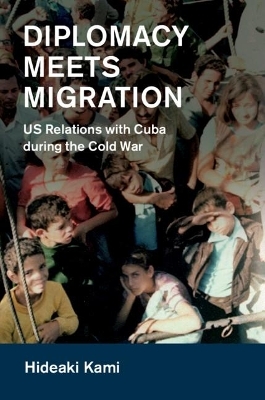
Diplomacy Meets Migration
US Relations with Cuba during the Cold War
Seiten
2018
Cambridge University Press (Verlag)
978-1-108-42342-7 (ISBN)
Cambridge University Press (Verlag)
978-1-108-42342-7 (ISBN)
Shows how migration influenced American foreign policy in Cuban-American relations during the Cold War. Drawing on multi-archival research, this study demonstrates how the US government reformulated its Cuban policy in response to the emergence of the Cuban-American community as a new, politically mobilized constituency.
Diplomacy Meets Migration examines diplomacy, migration, and the history of US relations with Cuba during the Cold War. Hideaki Kami draws on declassified US and Cuban diplomatic sources, as well as Miami-Cuban lobby records, to challenge traditional interpretations that mainly focus on the two national capitals, Washington and Havana. By incorporating Miami into the story of foreign affairs, Kami assesses the intersection between migration and diplomacy, and considers how migration emerged as a critical issue that shaped the dynamism of US relations with Cuba. Kami demonstrates that the US government reformulated its Cuban policy in response to Fidel Castro's institutionalization of power, while simultaneously trying to build a new relationship with the Miami Cuban community, a new, politically mobilized constituency within US society. He shows how both migration control and migrant politics became important components of US foreign policy, which in turn influenced Cuban policy toward the United States.
Diplomacy Meets Migration examines diplomacy, migration, and the history of US relations with Cuba during the Cold War. Hideaki Kami draws on declassified US and Cuban diplomatic sources, as well as Miami-Cuban lobby records, to challenge traditional interpretations that mainly focus on the two national capitals, Washington and Havana. By incorporating Miami into the story of foreign affairs, Kami assesses the intersection between migration and diplomacy, and considers how migration emerged as a critical issue that shaped the dynamism of US relations with Cuba. Kami demonstrates that the US government reformulated its Cuban policy in response to Fidel Castro's institutionalization of power, while simultaneously trying to build a new relationship with the Miami Cuban community, a new, politically mobilized constituency within US society. He shows how both migration control and migrant politics became important components of US foreign policy, which in turn influenced Cuban policy toward the United States.
Hideaki Kami is an Assistant Professor in the Faculty of Foreign Languages at Kanagawa University, Japan. He is a recipient of the Saito Makoto Prize and the Fulbright Award for Doctoral Studies, and has conducted archival research in the United States, Cuba, and elsewhere.
List of figures; Acknowledgments; List of abbreviations; Introduction; 1. Between revolution and counterrevolution; 2. The legacy of violence; 3. A time for dialogue?; 4. The crisis of 1980; 5. Acting as a 'superhero'?; 6. The two contrary currents; 7. Making foreign policy domestic?; Conclusion; Bibliography; Index.
| Erscheinungsdatum | 16.08.2018 |
|---|---|
| Reihe/Serie | Cambridge Studies in US Foreign Relations |
| Zusatzinfo | Worked examples or Exercises; 1 Maps; 9 Halftones, black and white |
| Verlagsort | Cambridge |
| Sprache | englisch |
| Maße | 160 x 235 mm |
| Gewicht | 640 g |
| Themenwelt | Geschichte ► Allgemeine Geschichte ► Zeitgeschichte |
| Geisteswissenschaften ► Geschichte ► Regional- / Ländergeschichte | |
| Sozialwissenschaften ► Politik / Verwaltung ► Staat / Verwaltung | |
| Sozialwissenschaften ► Soziologie | |
| ISBN-10 | 1-108-42342-6 / 1108423426 |
| ISBN-13 | 978-1-108-42342-7 / 9781108423427 |
| Zustand | Neuware |
| Haben Sie eine Frage zum Produkt? |
Mehr entdecken
aus dem Bereich
aus dem Bereich
Gewalt, Umwelt, Identität, Methode
Buch | Softcover (2024)
Spector Books OHG (Verlag)
36,00 €
wie Freud im Kollektiv verschwand
Buch | Hardcover (2024)
Klett-Cotta (Verlag)
25,00 €


